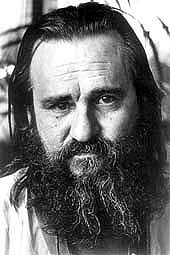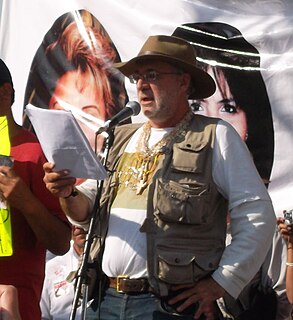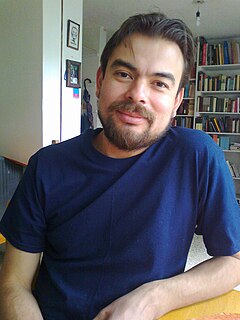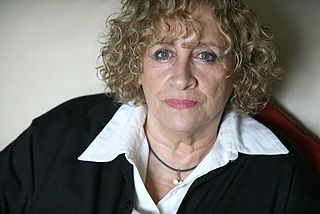Related Research Articles

Francisco Massiani was a Venezuelan writer and painter. His first novel, Piedra de mar has been a bestseller since its publication. It's a Bildungsroman of a middle class teenager in Caracas. Massiani, won the Municipal Prize of Prose in 1998, and in 2005, the V annual contest of the Fundación para la Cultura Urbana, for the storybook Florencio y los pajaritos de Angelina, su mujer. In 2006, he published his first book of poetry. In 2012 he won the National Prize for Literature, as a recognition to his entire body of work.

Javier Cercas Mena is a writer and professor of Spanish literature at the University of Girona, Spain.

Salvador Garmendia Graterón was a notable Venezuelan author, awarded in 1972 with the National Prize for Literature. In 1989 received the Juan Rulfo Prize for Tan desnuda como una piedra.

Ismael Serrano is a singer/songwriter and guitarist from Spain, popular in Spain and Latin America, known for his often political lyrics and eclectic musical influences. During his creative career he has been influenced by other Spanish singer-songwriters such as Joaquín Sabina, Joan Manuel Serrat and the Cuban Silvio Rodríguez amongst others. His music also shows influences from renowned poets such as Luis García Montero and Mario Benedetti.

Eve Gil is a Mexican writer and journalist from Hermosillo, Sonora. She is one of the major "NAFTA generation" authors. Her work has won a number of awards such as Premio La Gran Novela Sonorense in 1993, the Premio Nacional de Periodismo Fernando Benítez in 1994, the Concurso de Libro Sonorense in 1994, 1996 and 2006, and the Premio Nacional de Cuento Efraín Huerta in 2006.

Natalia Toledo Paz is a Mexican poet who writes in Spanish and Zapotec. Her work has helped to revive interest in the Zapotec language. Ida Kozlowska-Day states that Toledo is "one of the most recognized contemporary poets in the native languages of Mexico."

José Luis Vega is a Puerto Rican poet.

Luis G. Abbadie is a Mexican writer specializing in horror, paganism, pseudobibliographies and paramythologies, including horror and fantasy short stories. He has contributed frequently to the Cthulhu Mythos.
Mario Payeras (1940–1995) was a Guatemalan writer, philosopher, poet, essayist and Guatemalan guerrilla leader

Javier Sicilia is a Mexican poet, essayist, novelist, peace activist and journalist in Mexico. He contributes to various print media such as the Mexico City daily La Jornada and Proceso magazine. He was founder and director of El Telar, coordinator of several writing workshops, is a film and television writer, editor of Poesía magazine, a member of the editorial board of Los Universitarios y Cartapacios, the National System of Creators of Art since 1995, and is a professor of literature, aesthetics and screenwriting at Universidad La Salle at Cuernavaca and was director of the now-defunct magazine Ixtus.

Juan Gabriel Vásquez is a Colombian writer, journalist and translator. Regarded as one of the most important Latin American novelists working today, he is the author of seven novels, two volumes of stories and two books of literary essays, as well as hundreds of pages of political commentary. His novel The Sound of Things Falling, published in Spanish in 2011, won the Alfaguara Novel Prize and the 2014 International Dublin Literary Award, among other prizes. In 2012, after sixteen years in Paris, the Belgian Ardennes and Barcelona, Vásquez moved back to Bogotá. His novels are currently published in 28 languages.

Daniel Espartaco Sánchez is a Mexican writer. His second issue of short stories, Cosmonauta and his first novel, Autos usados appeared in the "best book of the year" lists from the Mexican magazine Nexos.

Margarita Carrera Molina was a Guatemalan philosopher, professor and writer. She was a member of the Academia Guatemalteca de la Lengua and the 1996 laureate of the Miguel Ángel Asturias National Prize in Literature.

Federico Gamboa Iglesias was a writer and diplomat from Mexico. He has been considered as one of the top representatives of Naturalism in México. Gamboa wrote novels, theater pieces, articles for newspapers and magazines and an autobiography when he was 28 years old. For many years took notes of his travels, experiences and thought, which he later published as five diaries. Posthumously another two more volumes of his diaries were published.
Science fiction in Chile began in the late 19th century with the publication of the books El espejo del mundo in 1875 by the Englishman Benjamin Tallman, about the modernization of Valparaíso and Santiago, and in 1877 of Desde Jupiter by Francisco Miralles, which recounted a trip to the planet and back.

Javier Gallego «Crudo» is a Spanish journalist, musician and poet. He is specially known for leading and conducting the radio program Carne cruda.

Hebe Uhart was an Argentine writer. In 2017, she received the Manuel Rojas Ibero-American Narrative Award.
Lola Arias is an Argentine actress, writer, and film and theater director.

Elena Fernández Gómez, known by the pen name Elena Santiago, is a Spanish writer, the recipient of honors such as the Rosa Chacel Award, the 1999 Province of Valladolid Literary Prize, and the Castile and León Award for Letters.

Selva Almada is an Argentine writer of poetry, short stories, and novels. She expanded into nonfiction in 2014 with the book Chicas muertas.
References
- ↑ Vania Isabel Vargas Morales: Guatemala revisitada: Un Análisis sociológico de la novela ruido de fondo de Javier Payeras – 1.2.1 Biografía (in Spanish), November 2009, p. 59.